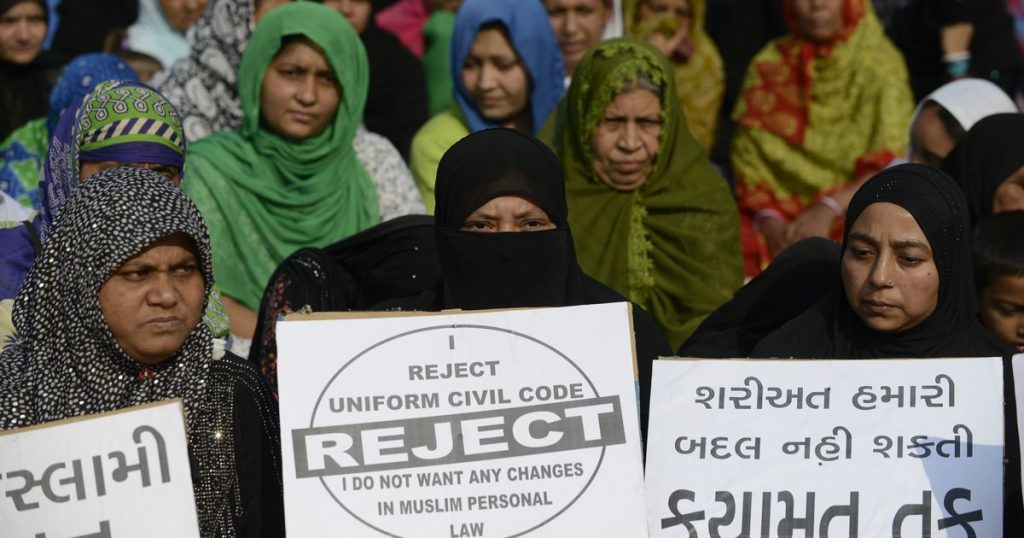Goa is abuzz with excitement as vintage bike and car owners, users, collectors and fans are decking […]

PATRIARCHAL AGENDA & RELIGIOUS MAJORITARIANISM MUST BE OPPOSED! By Nandita Haksar
July 22- July 28 2023 July 21, 2023With personal laws rooted in the discriminatory religious ideals that cut across lines, any Uniform Civil Code debate must put gender justice at the centre….
By Nandita Haksar
THE Uniform Civil Code is a complex issue and I myself have taken contradictory stands, each reflecting different concerns at various points of time. I began with being involved in the feminist movement and in 1986 wrote a book, Demystification of Law for Women, in support of a Uniform Civil Code that could guarantee equal rights to men and women.
Following my involvement with tribal rights, especially in Manipur, I was drawn to the idea of legal pluralism and explored tribal jurisprudence and the potential of tribal laws in delivering justice. Over time, I realised that customary law may at some point have been attractive but it has become stagnant. In the absence of tribal lawyers investing time in evolving customary laws, these customs would only serve to perpetuate patriarchy.
A dramatic example was witnessed in 2017 in Nagland when reservation for women in local bodies was opposed by tribal organisations saying it was against custom. I had even argued that the introduction of women’s reservation may have been a way of undermining Article 371(A) of the Constitution on the right of the Naga people to self-determination.
I have come to the conclusion that social and religious practices that go against human rights standards cannot be justified.
But now, both women’s rights and human rights are being weaponised and used to justify wars, conflicts and religious nationalism. How are fascists, religious extremists and fundamentalists to be prevented from hijacking the rights for which lakhs of women have sacrificed so much?
It is not a question of the rights of individual women but of women citizens as a whole.
COLONIAL ROOTS OF UCC
THE historical root of the controversies over the Uniform Civil Code lies in colonialism. The British government submitted a report in 1835 stressing the need for uniformity in the codification of Indian law relating to crimes, evidence and contracts, specifically recommending that the personal laws of Hindus and Muslims be kept outside such codification.
The British did not keep personal laws outside the purview of the civil code out of any respect for freedom of religion but for their own benefit: religion was a tool for their divide and rule policy – the basic tenet of their governance – that culminated in the partition of British India.
It suited the British to keep Indians backward to justify their rule. They resisted every attempt at social reform.
“The Status of Woman in India: a Handbook for Hindu Social Reformers” by Dayaram Gidumal from 1889 is illustrative of the prevailing attitudes towards women – that continue to this day.
Religious leaders such as Panchanandi Guttulal Ghanshyamji of Bombay, in his support for enforced widowhood, compared a widow to a “dining leaf used previously by another person”:
“…the thing called woman is the crowning piece of all objects of enjoyment in this world, and being subject to the special powers of the husband, is not like a house and capable of being enjoyed by her husband’s relations. How much more incapable must she then be of being fit for remarriage and enjoyment by a stranger. Like a dining leaf used previously by another person, she is unfit to be enjoyed by another person.”
It was only after 1856 that widow remarriage became legal and that too after campaigns by social reformers. For instance, one petition against widow remarriage was signed by 37,000 people led by conservative reformer Raja Radhakanta Deb before the bill was passed.
Hindu society and Hindu laws have been reformed over the decades but even today, a Hindu woman cannot be the “karta,” or manager, of a joint family. Despite legal reforms, child marriage and even sati have continued as well. After independence, many political leaders wanted one civil code as an instrument of national integration.
For instance, Chaudhury Hyder Hussain, a lawyer and member of the Constituent Assembly, said the idea of separate Hindu and Muslim codes was a “medieval idea” that had no place in the modern world:
“[L]iving under the British rule for about two centuries we have come to consider it only natural for Hindus to be governed by Hindu Law and Muslim to be governed by Muslim Law; but it is wholly a medieval idea and has no place in the modern world…I would therefore strongly urge the necessity of having one single code to be named as Indian Civil Code applicable to everybody living within the territory of Indian Union irrespective of caste, creed or religion persuasions. problem . It appears to be absolutely essential in the interest of the unification of the country for building up one single nation with one single set of laws in the country.”
There were those who emphasised the need for a uniform civil code that would ensure women equality and dignity. Some members of the Constituent Assembly, like Rajkumari Amrit Kaur, warned that the way Article 25 (freedom of religion) was being worded, would make future social legislation very difficult.
In the debates around the Uniform Civil Code in the Constituent Assembly, it was clarified that the new code would cover marriage and inheritance from the perspective of securing women’s rights.
Independent India’s first law minister, BR Ambedkar, resigned because Parliament did not pass the Hindu Code Bill that would have offered substantial protection to women.
CONTEMPORARY DEBATES
AGAINST this background, it is worth examining the contemporary debates over the proposal to introduce a Uniform Civil Code. First, the government, which includes the Law Commission, has not put forward the actual provisions to be included in the proposed Code. They have also not called upon women’s organisations to give their opinions.
The Law Commission’s notice has solicited the views of public and “recognised religious organisations” instead of seeking broad consultations with women organisations and civil society.
As a result, the Law Commission has been inundated by around 46 lakh submissions opposing a Uniform Civil Code. Who are these people opposed to the Uniform Civil Code? One thing is clear that those who have been the most vociferous in their opposition are not concerned with protection of the rights and dignity of women.
The All India Muslim Personal Law Board, which is opposing the introduction of the Uniform Civil Code, has never been a champion on women’s rights. All they say is that Prophet Mohammad recognised the rights of women – and there is no question that he did.
Prophet Mohammad’s position on women’s rights was ahead of the times he lived in, but the same cannot be said for the members of the Board. Prophet Mohammad recognised that marriages are contracts and women’s consent is an essential part of the contract. His followers have not taken his concerns forward. Now, in his name, they are opposing all possible reform while not initiating the reform on their own.
The same arguments are applicable to the Christian Church. The Church, both the Catholic and the Baptist, have practices seeped in patriarchy and their opposition to the Uniform Civil Code has nothing to do with women’s rights. Their opposition is in part because they do not want their power over Christian women to be undermined.
Buddha’s compassion was deep and his insights into the human condition inspire many around the world. He even allowed women to be monks. But he did not give them the same status as male monks. Guru Nanak, too, recognised the equality between men and women, but today, the Sikh community’s opposition to the Uniform Civil Code is not driven by concern for women’s rights or dignity – it is again a question of power.
The tribal organisations have opposed the Uniform Civil Code partly out of fear that the special provisions guaranteed in the Constitution to protect their land and natural resources may be affected. However, these tribal societies are deeply patriarchal and deny women equal rights, including the right to property. There is no movement for the social reform of fossilised customs denying women the right to any decision making institutions.
Among political parties, the ruling party in Tamil Nadu, the Dravida Munnetra Kazhagam, has opposed the Uniform Civil Code, but it is for political reasons rather than a commitment to women’s dignity or rights.
There are the other opposition parties whose stance on questions of women’s rights has been better. But their opposition to the Uniform Civil Code is driven more by their opposition to Hindu majoritarianism than with any thought to women’s rights.
Unprincipled alliances and a compromise on women’s rights and dignity are largely driven by compulsions of electoral politics and those who lust for power.
The fact that so many women from all communities and all classes are a party to their own oppression is a symptom of patriarchy. The real issue is not whether there should or should be a Uniform Civil Code but what kind of uniform civil code is being presented for debate.
WHY DO WE NEED THE UCC?
WHAT was the justification for introducing Article 44 in the Constitution to secure a Uniform Civil Code as a Directive Principle? Broadly, as many commentators have pointed out, it would lay out uniform, just and equal principles applicable to all religious communities in India.
In its submission to the Supreme Court, the government said that the purpose of Article 44 was to strengthen the objective of “Secular Democratic Republic, as enshrined in the Preamble”, according to The Indian Express.
However, it is important to remember that the imposition of uniformity in law does not necessarily imply non-discrimination and equality. Goan women’s organisations point out that a civil code – the state has a civil code – does not ensure equal rights for men and women. The language of human rights is universal but does not recognise patriarchy as a human rights violation.
The Bengaluru-based All India Lawyers Association For Justice, too, has pointed out in its submission to the 22nd Law Commission that the Commission has solicited views for the Uniform Civil Code without providing any reasons. “The Public Notice is especially deficient in that there is no draft of any proposed UCC, no definition of the ambit of such a proposal or even the definition of UCC,” said the Association.
The association also warns that a communally-charged push for a Uniform Civil Code will only result in political sparring: “Given that a communal sectarian UCC has been the longstanding agenda of the RSS and the BJP, this manner of garnering opinions, we fear, would only convert this into a political slugfest even though the provisions of the draft UCC are yet to be seen.”
Patriarchal laws and religion
The debate around a Uniform Civil Code must make women’s rights and dignity as the centre of its concern. But women’s rights has been weaponised by the BJP and this has led those opposing the ideology to weaponise human rights, especially the right to freedom of religion.
Fascism and religious nationalism of Hindus, religious fundamentalism, Islamic or Christian, have one thing in common: they all uphold patriarchy by justifying it on religious grounds and strengthening it by promoting patriarchal family as the only kind of legitimate family.
Personal laws, purportedly based on religion, serve to institutionalise this injustice and inequality.
The fight for women’s rights and the opposition to patriarchy is integral to the movement against fascism and religious fundamentalism. Women across community, class and caste suffer injustice, indignity and oppression.
What is this patriarchy? Listen to feminist scholar Kamala Bhasin explain this in her interview with actor Aamir Khan in the programme appropriately called Satyamev Jayate:
The vision of the women’s liberation movement always included the liberation of men. The suffragette anthem Bread and Roses makes it clear:
As we go marching, marching
In the beauty of the day
A million darkened kitchens
A thousand mill lofts gray
Are touched with all the radiance
That a sudden sun discloses
For the people hear us singing
Bread and roses, bread and roses
As we go marching, marching
We battle too for men
For they are women’s children
And we mother them again
There has to be a push for the Law Commission to make the contents of the proposed Uniform Civil Code public and let there be an informed debate on the contents. If it promotes the idea of gender justice, it must be supported. If it upholds and perpetuates patriarchy and furthers the agenda of Hindu majoritarianism we must oppose it.
Courtesy: The Scrolll
(Nandita Haksar is a human rights lawyer and award-winning author.)














